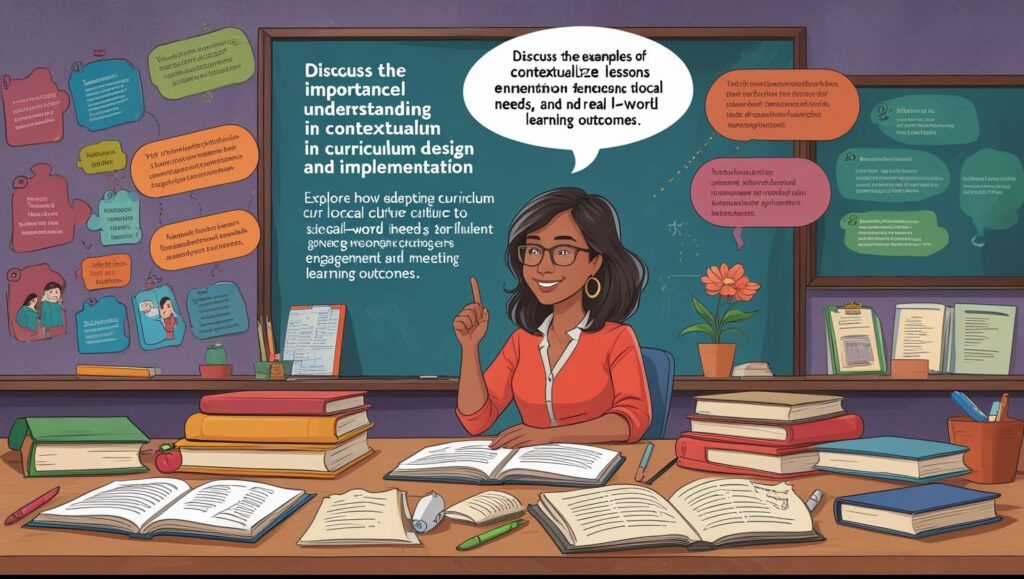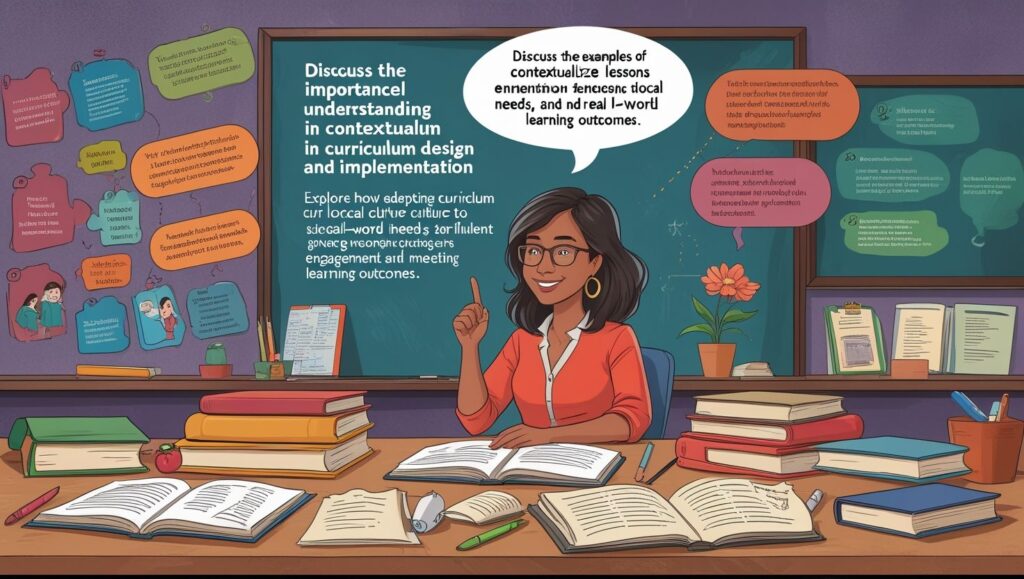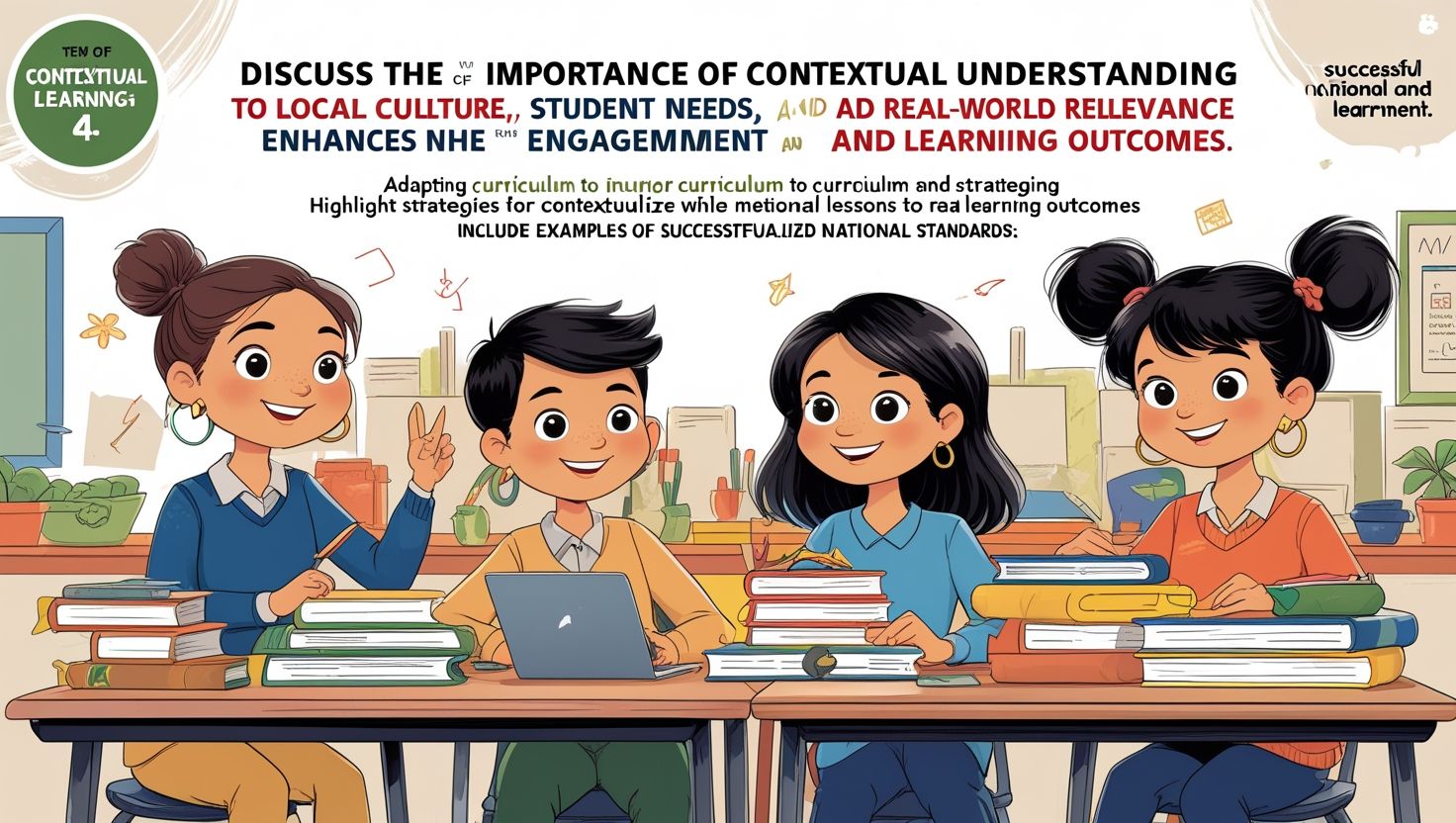Introduction:
Contextual Understanding of Curriculum, as the heart of educational endeavors, is a multifaceted concept that extends beyond the confines of textbooks and lesson plans. Its scope encompasses the entirety of the teaching and learning process, influencing not only what is taught but also how it is taught and assessed. In this exploration, we delve into the dynamic and contextual nature of curriculum, recognizing its pivotal role in shaping educational experiences, fostering critical thinking, and preparing students for an ever-evolving world.
Defining Curriculum:
At its core, curriculum represents the structured set of educational experiences designed to achieve specific learning outcomes. While it traditionally includes subjects, lessons, and assessments, a contemporary understanding of curriculum goes beyond this rigid framework. Curriculum is a living entity that evolves in response to societal changes, technological advancements, and educational philosophies. It embodies the collective decisions made by educators, policymakers, and stakeholders to guide the educational journey.
Contextual Framework:
One of the key aspects of a contextual understanding of curriculum is the acknowledgment that it is not a one-size-fits-all concept. Rather, it is deeply influenced by the cultural, social, and economic context in which it operates. Different regions, countries, and communities have unique educational needs, and the curriculum must be tailored to address these specific requirements. The local context shapes not only the content but also the methods of instruction, assessment strategies, and the overall educational philosophy.

Adapting to Educational Trends:
In a world characterized by rapid technological advancements and societal shifts, curriculum must adapt to stay relevant. The rise of digital literacy, emphasis on critical thinking skills, and the integration of interdisciplinary subjects are examples of trends that impact curriculum development. An understanding of the current educational landscape is essential for crafting a curriculum that prepares students for the challenges and opportunities they will encounter in the future.
Holistic Approach to Learning:
Beyond the traditional emphasis on academic subjects, a contemporary understanding of curriculum incorporates a holistic approach to learning. Recognizing the importance of nurturing not just cognitive but also social, emotional, and practical skills, educators aim to create a well-rounded curriculum. This holistic perspective addresses the diverse needs of students, fostering their personal development alongside academic achievement.
Interdisciplinary Connections:
The boundaries between subjects are becoming increasingly porous as the world becomes more interconnected. An effective curriculum recognizes the value of interdisciplinary learning, encouraging students to make connections across various disciplines. By breaking down the silos of traditional subject areas, students gain a deeper understanding of the complex interplay between different fields of knowledge, preparing them for the interdisciplinary nature of real-world challenges.
Cultivating Critical Thinking:
A curriculum’s success is not solely measured by the amount of information students can memorize but by their ability to think critically and apply knowledge. A contextual understanding of curriculum places a strong emphasis on cultivating critical thinking skills. This involves designing learning experiences that encourage inquiry, problem-solving, and the application of knowledge in diverse contexts.
Inclusive Practices:
The diversity within classrooms demands an inclusive approach to curriculum development. Recognizing and valuing diverse perspectives, experiences, and learning styles is integral to creating an inclusive curriculum. This inclusivity extends to considering the needs of students with different abilities, socio-economic backgrounds, and cultural contexts. A well-crafted curriculum ensures that all students have access to quality education, irrespective of their individual differences.

Continuous Evaluation and Adaptation:
Understanding curriculum contextually involves recognizing it as a dynamic and evolving entity. Regular evaluation and feedback mechanisms are crucial to assess the effectiveness of the curriculum and make necessary adjustments. This adaptability ensures that the curriculum remains responsive to emerging educational needs, providing students with a relevant and meaningful learning experience.
Conclusion:
A contextual understanding of curriculum recognizes it as a dynamic, responsive, and evolving aspect of education. It goes beyond the traditional view of a prescribed set of subjects, embracing the cultural. Social, and technological nuances that shape the educational landscape. By fostering a holistic approach to learning, encouraging interdisciplinary connections, cultivating critical thinking, and promoting inclusivity. A well-designed curriculum becomes a powerful tool for preparing students to navigate the complexities of the modern world. In the ever-changing educational panorama a contextual understanding of curriculum is not just a theoretical framework. But a practical necessity for crafting meaningful and impactful learning experiences.

excellent work keep u the good work.
Can you be more specific about the content of your article? After reading it, I still have some doubts. Hope you can help me.
s28ogx
hello!,I like your writing very much! share we communicate more about your post on AOL? I need an expert on this area to solve my problem. May be that’s you! Looking forward to see you.
eg912l
1nrulo
Its good as your other posts : D, appreciate it for posting.
super speed buyhacklink.com seo buyhacklink.com https://www.kusadasiteksex.com/
nshf3w
33p4e9
Way cool, some valid points! I appreciate you making this article available, the rest of the site is also high quality. Have a fun.
Sweet internet site, super design and style, really clean and utilize genial.
I have read some just right stuff here. Certainly value bookmarking for revisiting. I surprise how a lot effort you set to create the sort of wonderful informative website.
Can you be more specific about the content of your article? After reading it, I still have some doubts. Hope you can help me. https://www.binance.info/pl/join?ref=V2H9AFPY
I conceive other website proprietors should take this web site as an example , very clean and excellent user friendly design.
Useful info. Fortunate me I found your site unintentionally, and I am surprised why this coincidence didn’t came about in advance! I bookmarked it.
Hi! This post couldn’t be written any better! Reading through this post reminds me of my previous room mate! He always kept talking about this. I will forward this post to him. Fairly certain he will have a good read. Thank you for sharing!
My brother recommended I might like this web site. He was entirely right. This post actually made my day. You can not imagine just how much time I had spent for this information! Thanks!
Thanks for sharing. I read many of your blog posts, cool, your blog is very good.
The subsequent time I learn a blog, I hope that it doesnt disappoint me as much as this one. I imply, I know it was my choice to learn, but I truly thought youd have something attention-grabbing to say. All I hear is a bunch of whining about something that you can repair for those who werent too busy looking for attention.
I found your weblog web site on google and test a few of your early posts. Continue to maintain up the very good operate. I just extra up your RSS feed to my MSN News Reader. Looking for ahead to studying extra from you afterward!…
ขอบคุณสำหรับบทความนี้ ที่สรุปเรื่อง
IQOS Thailand ไว้ดี เห็นภาพรวมทั้งหมดเลย เคยลองใช้แล้วประทับใจ มีรีวิวเปรียบเทียบรุ่นไหมคะ
I do like the manner in which you have presented this particular situation and it does provide us a lot of fodder for consideration. Nonetheless, from everything that I have witnessed, I just simply hope as other reviews stack on that people keep on issue and don’t embark upon a soap box involving some other news of the day. All the same, thank you for this excellent point and though I do not really agree with this in totality, I regard your perspective.
Can you be more specific about the content of your article? After reading it, I still have some doubts. Hope you can help me.
I don’t think the title of your article matches the content lol. Just kidding, mainly because I had some doubts after reading the article. https://www.binance.com/en-IN/register?ref=UM6SMJM3
Choosing Law firm Thailand can make your stay and investments in Thailand much smoother.
They understand Thai immigration law, ensuring all documents are properly handled.
Reliable firms also handle Notary public Thailand, offering
expert Legal advice Thailand to protect expats within the Expat
community Thailand.
I don’t think the title of your article matches the content lol. Just kidding, mainly because I had some doubts after reading the article.
Hey very nice web site!! Man .. Excellent .. Amazing .. I’ll bookmark your web site and take the feeds also…I’m happy to find numerous useful info here in the post, we need work out more strategies in this regard, thanks for sharing. . . . . .